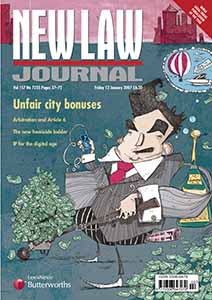
Criminal Justice Act 2003 (Commencement No 14 and Transitional Provision) Order 2006 (SI 2006/3217):
The Employment Rights (Increase of Limits) Order 2006 (SI 2006/3045):
The media’s obsession with itinerant sex offenders misses more problematic flaws within the notification scheme, says Alisdair Gillespie
District Judge Stephen Gold with an antidote to seasonal excess—new tribunals
R (Meredith) v Harwich Magistrates’ Court [2006] All ER (D) 45 (Dec):
Victoria von Wachter explains how Keen restricts the scope of possible challenge to discretionary bonus decisions
In brief
Ian Smith explains why 2006 went out with a bang
MOVERS & SHAKERS

Freeths—Ruth Clare
National real estate team bolstered by partner hire in Manchester

Farrer & Co—Claire Gordon
Partner appointed head of family team

mfg Solicitors—Neil Harrison
Firm strengthens agriculture and rural affairs team with partner return









